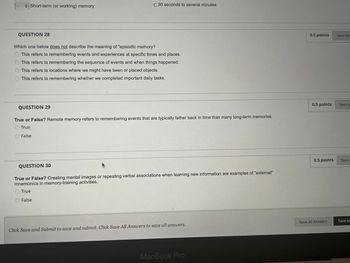Question

Transcribed Image Text:◆ Short-term (or working) memory
C.30 seconds to several minutes
QUESTION 28
Which one below does not describe the meaning of "episodic memory?
This refers to remembering events and experiences at specific times and places.
This refers to remembering the sequence of events and when things happened.
This refers to locations where we might have been or placed objects.
This refers to remembering whether we completed important daily tasks.
QUESTION 29
True or False? Remote memory refers to remembering events that are typically father back in time than many long-term memories.
True
False
QUESTION 30
True or False? Creating mental images or repeating verbal associations when learning new information are examples of "external"
mnemonics in memory-training activities.
True
False
Click Save and Submit to save and submit. Click Save All Answers to save all answers.
MacBook Pro
0.5 points
Save Ans
0.5 points
Save A
0.5 points
Save
Save All Answers
Save an
Expert Solution
This question has been solved!
Explore an expertly crafted, step-by-step solution for a thorough understanding of key concepts.
Step by stepSolved in 1 steps

Knowledge Booster
Similar questions
- What are the different types of long term memory?arrow_forwardI am doing an essay for Neural Bases of Communication class, so how is aphasia, verbal apraxia, and dementia similar to one another?arrow_forwardIntro to Neuroscience Question: Damage to the cerebro-cerebellar pathway would be most likely to cause…. Group of answer choices Dysmetria Gait disturbances Huntington’s disease Parkinson’s disease Is this reasoning correct? The cerebro-cerebellar pathway involves connections between the cerebrum and the cerebellum. These connections play a role in the planning, initiation, and timing of movements, as well as motor learning. Given the functions associated with the cerebro-cerebellar pathway, damage to it would most likely lead to issues with the accuracy and timing of movements. Among the options provided: Dysmetria is the most likely outcome. Dysmetria refers to the inability to judge distance or range of a movement, leading to overshooting (hypermetria) or undershooting (hypometria) a target.arrow_forward
- 2016 Pearson Education, Inc. A B C D E F 144 [Choose] [Choose ] [Choose] [Choose] [Choose ] [Choose] D Earrow_forwardWhat are the challenges you anticipate in assessing an older adult with a memory concern?arrow_forwardMr. Burke’s Physical Therapist Lisa is training him on using a walker, giving step-by-step instructions. He has a hard time consolidating and retrieving the instructions when she tells him what to do verbally. She has noticed he does better when she demonstrates or shows him pictures of each step. What does this tell you about where he may have sustained brain damage and why?arrow_forward
- Mavis (84years old), referred to you in the memory clinic for assessment of memory impairment. On the pre-clinic questionnaire she has reported a mild to moderate deterioration in all aspects of her cognition over the past six months. The patient herself acknowledges that there have been memory problems, but feels it is just her short-term memory that is an issue. She has been prescribed Donepezil 10mg OD. Question: With reference to dementia provide an exploration of this scenario. Please include discussion of the mechanism of action of Donepezil.arrow_forwardPlsssssssss helpppp, was HIPAA violated in this scenario?arrow_forward1)arrow_forward
arrow_back_ios
arrow_forward_ios